Julius-Maximilians-Merit-Medal
Based on the decision of the university management of 02.12.2019, the new "Julius Maximilians Medal" will be awarded by the university management as a university honor for special service starting in 2020.
It thus replaces the Bene Merenti Medal previously awarded. The honorees of this medal in gold, silver and bronze can be found here.
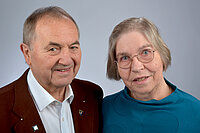
Ulrike and Norbert Täuber (2024)
Alumni Ulrike and Norbert Täuber were awarded the Medal of Merit in recognition of their continuous, reliable and great commitment to the JMU alumni network. The two members of the central alumni association returned from Stuttgart to Würzburg in 2012 after retiring. For five years, they volunteered a few hours every week in the alumni office. They used their many contacts to recruit new association members and financial supporters for alumni projects. They also supported many of these projects themselves.
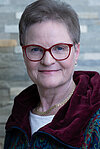
Prof. Dr. Esther Asan (2024)
Professor Esther Asan received the medal in recognition of her great services to gender equality and early career researchers. The medical scientist and expert in neuroanatomy was just as concerned with the individual advancement of students and junior researchers as she was with gender equality. For eight years, she was a member of the Commission for the Advancement of Young Scientists and Women at the Faculty of Medicine; she also worked for many years as Women's Representative and Deputy Women's Representative at the Faculty of Medicine and as Deputy Women's Representative at JMU.
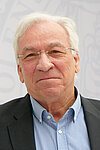
Prof. Dr. Roland Baumhauer (*1956), honored 2024
Professor Roland Baumhauer held the Chair of Geography I with a focus on Physical Geography from 2001 to 2022; since then he has been a senior professor at JMU. He received the medal in recognition of his great services to interdisciplinary and international research and teaching as well as knowledge transfer. He has initiated collaborations with computer science, biology and other subjects and has maintained numerous international collaborations, including with universities in Iran, Niger and France.
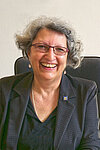
Adelgunde Wolpert (2023)
With Adelgunde Wolpert, Julius-Maximilians-Universität honors an employee from the field of science support staff, which she accompanied and helped shape for a long time: As a technical employee at the Biozentrum, as a staff councilor, and finally as JMU's Equal Opportunity Officer. After her training as a chemical laboratory assistant at the Medical University Hospital, Adelgunde Wolpert first worked in the special research area "Biology of the Oral Cavity" at the Julius Maximilians University. This was followed by further employment as a technical assistant at various institutions of the JMU. From 2000 to 2021, Adelgunde Wolpert held the office of Equal Opportunity Officer for the science-supporting area. Aware of her responsibility for the employees, she was already involved in the first equal opportunity concept of JMU. Through public relations measures, exhibitions and innovative projects, she raised awareness of a cross-cutting issue that gained in urgency and attention with each passing year. She also helped shape JMU through many years of individual consultation and personal contact with staff. Among the milestones of her tenure were the "Secretariat Network," which she initiated in 2006, and the "Administrative ABC," which was created with her significant input. She also advocated gender-related health promotion with conviction and was one of the founding members of the steering committees "Healthy University" and "Conflict Management". In addition, she initiated her own health promotion projects. For many years, she contributed her expertise to state and federal politics and was committed to gender equality. At the 2023 Foundation Festival, JMU will award Adelgunde Wolpert the Julius Maximilians Medal of Merit in recognition of this extensive and long-standing commitment.
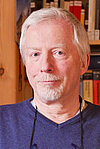
Prof. Dr. Karl-Heinz Lembeck (*1955), honored 2023
Karl-Heinz Lembeck passed his first state examination in philosophy, Catholic theology, and teacher training in 1981. Subsequently, he worked as a research assistant at the Institute of Philosophy at the University of Trier. In 1986 Karl-Heinz Lembeck received his doctorate and worked as a research assistant. In 1993 followed his habilitation in philosophy. From 1995 to 1996 he held an endowed guest professorship in philosophy at the "Humboldt Study Center for Philosophy and Humanities" at the University of Ulm. In 1996 Lembeck accepted the call to the chair of theoretical philosophy at the University of Würzburg. In 2006 he was also appointed honorary professor of philosophy at the University of Ulm. Karl-Heinz Lembeck served the university for a total of 25 years until his retirement in 2021. His research focused on phenomenology, neo-Kantianism, and hermeneutics. Lembeck's work has helped shape phenomenology in Würzburg and widely promoted the institute's high professional reputation. His expertise is gratefully claimed by several leading organizations. After many years as Secretary General of the "German Society for Phenomenological Research" he was elected President of the organization. He also performs important tasks at the "Humboldt Study Center" of the University of Ulm. A special concern of Karl-Heinz Lembeck has always been the promotion of interdisciplinary dialogue and scientific exchange. Outside of research and teaching, he was active for many years in various committees and, for example, as Chairman of the Senate, actively helped to shape university policy. In all social and cooperative matters, he distinguished himself through fairness, expertise and prudence. In recognition of his outstanding achievements, Julius-Maximilians-Universität Würzburg will award Prof. Dr. Karl-Heinz Lembeck the Julius-Maximilians Medal of Merit on the occasion of the 2023 Foundation Festival.
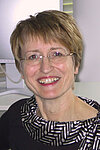
Prof. Dr. Dorothea Klein (*1954), honored 2023
Dorothea Klein studied German language and literature, history and social studies at the University of Würzburg and graduated in 1980 with the First State Examination. She subsequently worked as a research assistant in various research networks at the universities of Würzburg, Eichstätt, and Münster and habilitated in 1996. As a private lecturer, she held professorships in medieval German philology in Marburg and Bamberg before being appointed to the professorship of older German literature at the Kiel University (CAU) in 2001. In 2007 until her retirement in 2020, she worked in the department of German Philology at the University of Würzburg. Dorothea Klein represented and continues to represent Older German Literature in its entire breadth. Her research focuses on lyric poetry, poetics and aesthetics of medieval literature, text and transmission history, and edition philology. With her publications, she created essential foundations for the discipline and opened new perspectives. Dorothea Klein has played an important role for the College "Middle Ages and Early Modern Times". She has also made a name for herself as editor and co-editor of numerous editions and collected works as well as scholarly book series. For more than ten years, she has also been in charge of organizing the "Publications from the College 'Middle Ages and Early Modern Period'", which she founded. Conveying scholarly content to a broad audience has always been an important concern for Dorothea Klein. Finally, her commitment as Dean of Studies of the Faculty of Humanities from 2011 to 2018 and her promotion of young scholars should be highlighted. She has succeeded in providing important impulses for research through a significant, structure-building commitment and has made a valuable contribution to shaping the profile of German philology as well as the Faculty of Humanities. In recognition of her outstanding achievements, the Julius Maximilians University of Würzburg awards Prof. Dr. Dorothea Klein the Julius Maximilians Medal of Merit on the occasion of the Foundation Festival 2023.
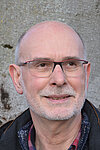
Dr. Jörg Klawitter (*1956), honored 2023
Jörg Klawitter studied to become a teacher for elementary and secondary schools at the Julius Maximilian University. He successfully completed his studies in 1980 with the first state examination. This was followed by a second degree in philosophy, education, and political science. In 1984 he was awarded his doctorate by the University of Würzburg and was employed at the Julius-Maximilians-University from that time until his retirement in 2022. After various project-related appointments, he succeeded in moving to the then Faculty of Philosophy III in 1987. The Institute of Political Science and Sociology remained his academic home, where he progressed through the various career stages to the position of Senior Academic Director. He also held a wide variety of offices, always working for the good of the university. As a member of numerous working groups, commissions, and committees of the academic self-administration as well as in the State Ministry, he helped shape the fate of the Julius Maximilians University. From 1990 onwards, he was repeatedly entrusted with matters relating to the Computer Center. In this context, Jörg Klawitter helped to shape the dawn of a new media and information age for the university. In 2007, he was also appointed to the Board of Trustees of the Dr. Herbert Brause Foundation. Jörg Klawitter was also jointly responsible for university construction projects and was also active in the area of university budgeting. From 1996 to 2002, he was involved in the university's academic mid-level staff as deputy spokesman of the Covenant of Academic Staff. Finally, from 1998 on, he also represented the group of academic staff in the Senate/University Council. Jörg Klawitter held the office of Vice Dean for more than 15 years. In recognition of his outstanding achievements, Julius-Maximilians-Universität Würzburg awards Dr. Jörg Klawitter the Julius-Maximilians Medal of Merit on the occasion of the Foundation Festival 2023.
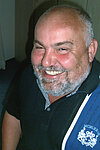
Thomas Frisch (1964-2022), honored 2023
With governing councillor Thomas Frisch, who passed away in March 2022 at the age of 58, Julius Maximilians University honors a long-time and highly deserving employee of the central administration in the area of student services. Thomas Frisch entered service with the German Armed Forces Administration after graduating from high school in 1983, where he successfully completed the career path for the higher non-technical administrative service. He then worked as an administrative officer at various locations from 1987 to 1989 before coming to Julius Maximilians University in November 1989. He began working in what was then Unit I A 2, now the Student Affairs Office, where he was soon appointed deputy head of unit. In March 2001, he became head of the Student Office. Thomas Frisch is one of the employees who met the challenges of the further development of the university administration with comprehensive competence, personal commitment, and a desire for change. When the redesign of business processes was due in 2010, he played a major role in introducing and implementing the modern campus management system WueStudy at the University of Würzburg. With his personal contribution to this and other crucial developments of the student service, he ensured that JMU was able to continuously evolve with its offers and services for students. The Julius Maximilians University of Würzburg takes the great loss of this highly deserving employee as an opportunity to honor him with the Julius Maximilians Medal of Merit at the Foundation Festival for his contribution to the development and modernization of the central administration.
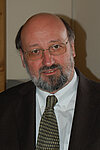
Prof. Dr. Michael Erler (*1953), honored 2023
Michael Erler studied Ancient Greek, Latin and Philosophy at the University of Cologne and at University College London. In 1977 he completed his Master's degree as a scholarship holder of the German National Academic Foundation and received his doctorate from the University of Cologne. In 1980 he passed the state examination. Initially, Michael Erler worked as a research assistant at the Institute of Classical Studies, Department of Papyrology in Cologne, and later in the Department of Literary Studies at the University of Constance. In 1984/85 he habilitated there and was accepted into the Heisenberg Program. After holding professorships in Munich for Greek and in Erlangen for Latin, Michael Erler conducted research as a Junior Fellow at the Center for Hellenic Studies in Washington, D.C. From 1989 to 1991 he held a professorship for Latin at the University of Erlangen-Nuremberg, and in 1990 he was a Fellow at the Institute for Advanced Studies in Edinburgh. In 1991 he accepted the call to the chair of Classical Philology with a focus on Greek Studies at the University of Würzburg, which he held until his retirement in 2019. In 2013, he received an honorary doctorate from the Aristotle University of Thessaloniki. Since his retirement, Michael Erler has been a senior professor at the university and chairman of the board of directors of the Siebold-Collegium Institute for Advanced Studies (SCIAS). He has represented his subject in research and teaching in great breadth, always keeping an eye on papyrology. One focus of his research was ancient philosophy, which made the Würzburg Institute for Classical Philology an internationally known place of scholarly exchange in this field. Through his publications, Michael Erler became a renowned representative of his field. He has been particularly committed to interdisciplinarity and internationality during his career at the University of Würzburg. In addition, he has been instrumental in (re)establishing a focus on papyrology in conjunction with the Digital Humanities. In doing so, he has enthusiastically shared his knowledge with students, scholars, and a broader audience and promoted the subject. As a member of numerous committees of the academic self-government, for example as dean and senator, he has been committed to the Julius Maximilians University. He was a reviewer for several national and international institutions and foundations. As director of the Siebold-Collegium - Institute for Advanced Studies (SCIAS) since 2016 and as senior professor, Michael Erler continues to try to promote the concerns of internationality and interdisciplinarity that are important to him. In recognition of his outstanding achievements, the Julius Maximilians University of Würzburg awards Prof. Dr. Michael Erler the Julius Maximilians Medal of Merit on the occasion of the Foundation Festival 2023.
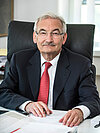
Prof. Dr. Georg Ertl (*1950), honored 2022
Georg Ertl joined the Medical Clinic of the University of Würzburg as a research assistant in 1981. In 1986, he habilitated in internal medicine and became a senior physician as an internist and cardiologist. In 1991, he became a university professor and senior consultant at the University Hospital of Würzburg (UKW). In 1995, Georg Ertl accepted the appointment to the Chair of Cardiology at the Faculty of Clinical Medicine Mannheim/Heidelberg. Back in Würzburg, he succeeded him in 1999 as Director of the Medical Clinic and Polyclinic I at the UKW and held the Chair of Internal Medicine. It was not only as Dean of the Medical Faculty that he was particularly committed. He was chairman of the German Society for Internal Medicine. Georg Ertl has been a member of the Leopoldina, National Academy of Sciences, since 2002. From 2016 to 2020, he steered the fortunes of UKW and its more than 7000 employees as Medical Director and Chairman of the Board. At the end of 2020, Georg Ertl retired as Medical Director.
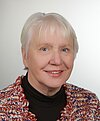
Prof. Dr. Barbara Hahn (*1952), honored 2022
Since 2001, Barbara Hahn held the Chair of Geography III - General and Applied Economic Geography at the University of Würzburg. She held this chair until her retirement in 2021. Since her successor to the chair will not take up her duties until July 2022, Barbara Hahn is thankfully filling in for her own chair until then. She has served on the Board of Directors since 2005, as Deputy Director from 2009 to 2013, and as Director of the Bavarian American Academy (BAA) from 2013 to 2017. Until 2018, Barbara Hahn was also a member of the advisory board of the Stiftung Bayerisches Amerikahaus gGmbH in Munich, which was founded in 2014. Between 2017 and 2022, she chaired the section "Geography and Economics" in the Gesellschaft für Kanada-Studien e.V. Barbara Hahn rendered outstanding service to the academic self-administration of JMU from 2003 to 2005 as Dean of the former Faculty of Earth Sciences. Prior to that, she was one of the first women's representatives at JMU and was particularly committed to equal opportunities.
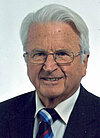
Prof. Dr. Dr. h.c. mult. August Heidland (*1929), honored 2022
His training as a specialist in internal medicine from 1958 to 1964 led August Heidland to Würzburg, where he also habilitated in 1966. August Heidland's research interests include work on "Kidney Transplant Rejection and Protease Activation," the "Biocompatibility of Dialysis Membranes," and "Protein Catabolism in Acute Uremia. His list of publications shows more than 500 titles. In the course of his work, he raised significant amounts of third-party funding for nephrological research. In his 36 years at the University Hospital of the JMU, August Heiland built up a clinically and scientifically highly respected nephrology and created completely new structures of patient care. As the initiator and spiritual father of the so-called "Gelehrtentafeln" (scholars' tables), after his retirement he created a public relations format that is still indispensable today and made a very significant contribution to the reappraisal of the university's history.

Dr. Wolfgang Geise (*1954), honored 2022
Dr. Wolfgang Geise was the first full-time animal welfare officer at JMU. In this function, he further developed animal welfare at JMU, including the hospital, to the best possible standard. After his appointment to the civil service for life in 1997, he was appointed Authorized Representative for Biological Safety for the entire area of the University of Würzburg and the hospital in 1998. In the same year, he was appointed Academic Senior Councillor and, in 2003, Academic Director. In 2015, Wolfgang Geise took over the management of the staff unit Occupational Safety, Health, Animal and Environmental Protection, first on a temporary basis and then full-time in 2016. In 2018, he was appointed Senior Academic Director. He was instrumental in managing the Corona pandemic at JMU by initiating a one-stop shop in his staff office and creating the Covid 19 homepage. He was also very involved in JMU's Sustainability Commission, contributing his good ideas in particular.
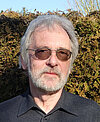
Dr. Eberhard Rommel (*1955), honored 2022
Between 1993 and 1995, Eberhard Rommel was a research associate in the Collaborative Research Center 355 "Pathophysiology of Heart Failure" at the University of Würzburg. His field of work included fast quantitative cardiac imaging in the rat as well as sample head construction. Eberhard Rommel's scientific work includes more than 50 publications. He has filed three patents. He is also a co-winner of the Helmholtz Prize awarded in 2003. Highly motivated and with great dedication, Eberhard Rommel has led the physics practical course for students minoring in physics for over 25 years. From 1996 to 2003, he also headed the electronics workshop of the Physics Institute. Furthermore, he participated in the self-administration of JMU for more than eighteen years and stood up for the interests of the scientific staff in the Faculty Council of the Faculty of Physics and Astronomy, in the Senate, in the University Council, in the Commission for Sustainable Development and as Convention Speaker and also as Deputy Speaker of the LWB (Landesverband Wissenschaftler in Bayern). In 2021, he retired as Senior Academic Director.
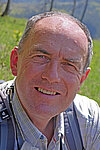
Prof. Dr. Markus Riederer (*1956), geehrt 2021
After his studies, he passed through various positions in academia before accepting the call to JMU in 1994, where he has since conducted research and taught as Professor of Botany and Director of the Botanical Garden. He also held a visiting professorship at the Chinese Academy of Sciences between 2012 and 2017. His innovative research on the surface of plants (cuticle) and their interactions with the environment, has received international attention. Markus Riederer has also earned special scientific merits as spokesman for two DFG Collaborative Research Centers and a Bavarian Research Association at JMU and, as founding coordinator of the Excellence Initiative of the German federal and state governments from 2006 to 2009, made a decisive contribution to the establishment of the Graduate School of Life Sciences (GSLS) at JMU and launched the multiple award-winning practice platform LehrLernGarten in the Botanical Garden. In addition, he was extensively involved in JMU as dean, member of the senate and dean of studies and was a member of the Bavarian Academy of Sciences and Humanities and a member of the National Academy of Sciences Leopoldina.
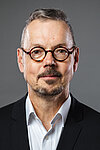
Prof. Dr. Peter Bofinger (*1954), honored 2021
After studying economics and earning his doctorate in Saarbrücken, his path took him via various highly remunerated positions to Würzburg, where he held the chair of economics, money and economic relations until his retirement. Peter Bofinger was instrumental in obtaining an endowed professorship in "Economic Journalism" for the Faculty of Economics, and was actively involved in the JMU Senate and the German Council of Economic Experts. From 2015 to 2019, he was ranked in the TOP 10 of the FAZ ranking of the most influential economists in the German-speaking world and received the Kurt Rothschild Prize for Economic Journalism from the Karl Renner Institute.
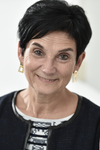
Prof. Dr. Marie-Christine Dabauvalle (*1954), honored 2020
Prof. Dr. Dabauvalle has been an adjunct professor at JMU since 1998. She had already been working at the University of Würzburg since 1987, after completing her education up to her doctorate in France. As a member of the examination board at the Würzburg-Schweinfurt Chamber of Industry and Commerce (IHK), she was awarded the Gold Badge of Honor. She internationalized the profile of the University of Würzburg through her involvement in two Franco-German scientific summits held here. In addition, Prof. Dr. Dabauvalle has made a significant contribution to the equality of women in science through her high level of commitment as University Women's Representative.
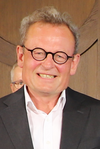
Dr. Peter Pfriem (*1954), honored 2020
After studying to become a teacher for elementary schools with a focus on secondary modern schools at the JMU and teaching for several years at the MIttelschule (formerly Hauptschule) Heuchelhof in Würzburg, Dr. Pfriem accepted a (part-time) position as a research assistant at the JMU and was appointed as a permanent civil servant in 2000. The development of the profile subject of the Bavarian secondary school "Didactics of Work Education" is due to his tireless personal commitment - his work significantly expanded the curriculum in terms of content and form, thus adapting it to the requirements of several generations.




![[Translate to Englisch:] Nobelpreis Röntgen Ausschnitt](/fileadmin/_processed_/8/4/csm_Nobelpreis_Ausschnitt_cbf91ddcc5.jpg)
